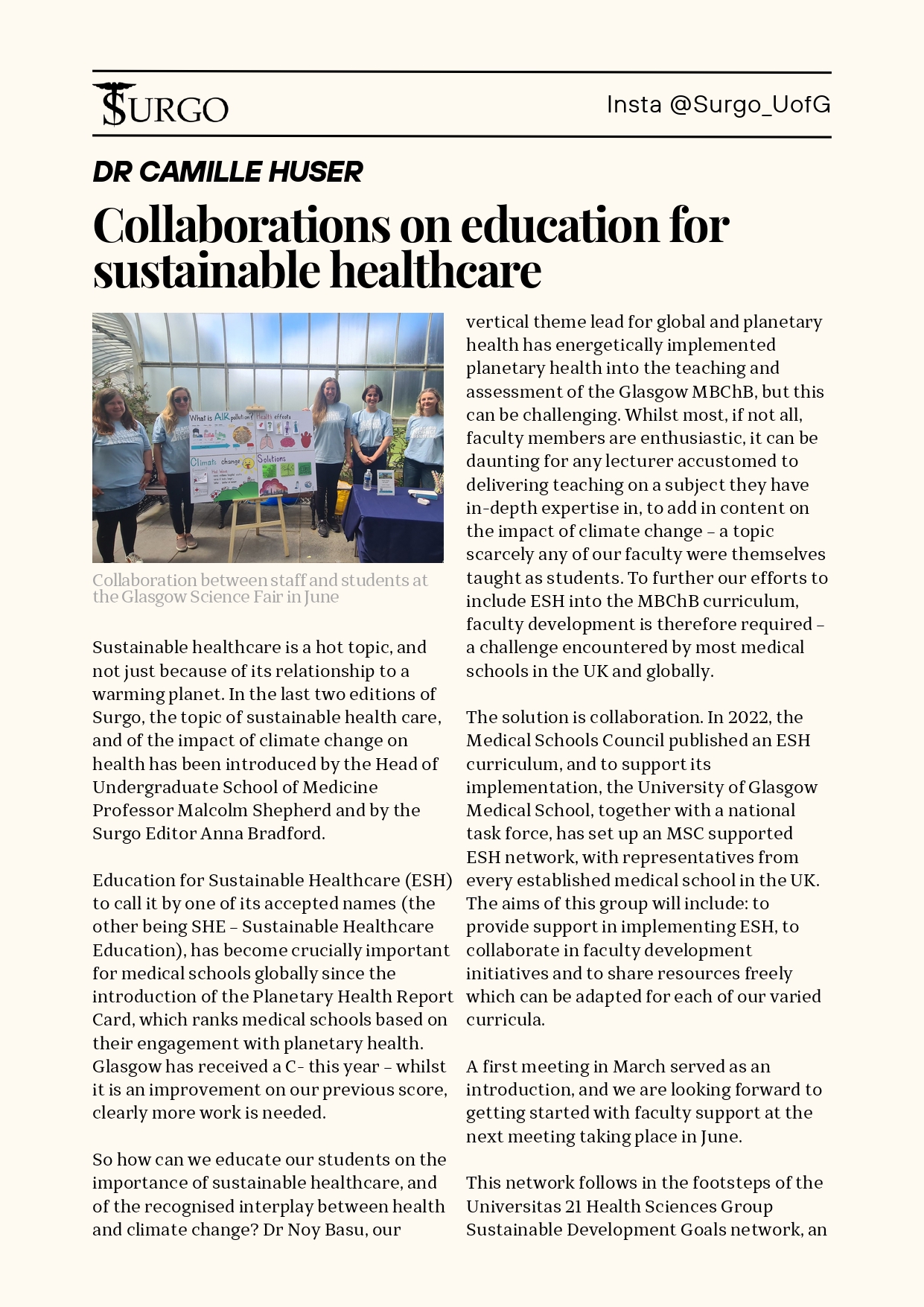Collaborations on education for sustainable healthcare
DOI:
https://doi.org/10.36399/Surgo.1.306Abstract
Sustainable healthcare is a hot topic, and
not just because of its relationship to a
warming planet. In the last two editions of
Surgo, the topic of sustainable health care,
and of the impact of climate change on
health has been introduced by the Head of
Undergraduate School of Medicine
Professor Malcolm Shepherd and by the
Surgo Editor Anna Bradford.
Education for Sustainable Healthcare (ESH)
to call it by one of its accepted names (the
other being SHE – Sustainable Healthcare
Education), has become crucially important
for medical schools globally since the
introduction of the Planetary Health Report
Card, which ranks medical schools based on
their engagement with planetary health.
Glasgow has received a C- this year – whilst
it is an improvement on our previous score,
clearly more work is needed.
So how can we educate our students on the
importance of sustainable healthcare, and
of the recognised interplay between health
and climate change? Dr Noy Basu, our
vertical theme lead for global and planetary
health has energetically implemented
planetary health into the teaching and
assessment of the Glasgow MBChB, but this
can be challenging. Whilst most, if not all,
faculty members are enthusiastic, it can be
daunting for any lecturer accustomed to
delivering teaching on a subject they have
in-depth expertise in, to add in content on
the impact of climate change – a topic
scarcely any of our faculty were themselves
taught as students. To further our efforts to
include ESH into the MBChB curriculum,
faculty development is therefore required
a challenge encountered by most medical
schools in the UK and globally.
The solution is collaboration. In 2022, the
Medical Schools Council published an ESH
curriculum, and to support its
implementation, the University of Glasgow
Medical School, together with a national
task force, has set up an MSC supported
ESH network, with representatives from
every established medical school in the UK.
The aims of this group will include: to
provide support in implementing ESH, to
collaborate in faculty development
initiatives and to share resources freely
which can be adapted for each of our varied
curricula.
A first meeting in March served as an
introduction, and we are looking forward to
getting started with faculty support at the
next meeting taking place in June.
This network follows in the footsteps of the
Universitas 21 Health Sciences Group
Sustainable Development Goals network, an international and interprofessional
partnership which the University of
Glasgow Medical School has been a part of
since 2017. The network has established a
Global Learning Partnership, which takes
place in Nepal, and at which University of
Glasgow students have had a
transformative experience every year, as a
self-proposed SSC. The network also
organises an annual student workshop
weekend – it takes place in June in
Nottingham, and this year looks at big data
and sustainability. The University of
Glasgow is taking five students across the
schools of medicine, dentistry and nursing.
The network has also created teaching
resources in the form of case studies, which
are freely available, and which we use in our
“Introduction to sustainable healthcare”
SSC.
Collaboration, under the guise of
partnerships, is one of the SDGs itself
(number 17), and it is so important and key
to delivering the other SDGs that it is the
only mandatory SDG reported in the Times
Higher Education (THE) IMPACT awards,
ranking universities globally based on their
impact on the SDGs.
So let’s celebrate collaboration nationally
and internationally to empower our faculty
to deliver ESH, and hope to see the fruits of
these collaborations in a curriculum near
you soon!


